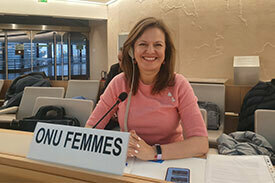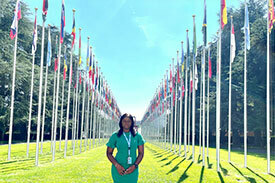
The University of Notre Dame’s master of global affairs (MGA) students have been actively advancing gender equality and the rights of women and girls at the United Nations through field placements at UN Women in Geneva.
In the past year, three graduate students from the Kroc Institute for International Peace Studies have taken internships and fellowships with the UN Women’s Human Rights and Development team, participating in high-level forums, meetings, and bilateral exchanges with Member States, UN agencies, civil society, and other stakeholders to protect and promote the rights of women and girls.
UN Women plays a strategic role in Geneva and across the UN system, including at the General Assembly and the Security Council, in its mandate to advance gender equality and women empowerment. The Human Rights and Development team covers the three annual Human Rights Council sessions, which discusses an average of 30 resolutions per session and works closely with Special Rapporteurs and other human rights mechanisms, such as the Committee on the Elimination of All Forms of Discrimination Against Women (CEDAW) and the Committee on the Elimination of Racial Discrimination (CERD).
Through the collaborative partnership between UN Women and the University of Notre Dame, the Kroc Institute advances its scholar-practitioner approach for its students on topics related to international development, peace, and justice that foster human dignity and equality.
“The partnership with UN Women is an important part of our internship program,” said Norbert Koppensteiner, director of the international peace studies concentration (Master of Global Affairs) and associate teaching professor of peace studies at the Keough School of Global Affairs. “For our students it means a unique opportunity to advance work on some of the most crucial topics of our time. They gain first-hand experience with a global institution at the forefront of combating gender inequality and strengthening human rights.”
Advancing Gender Equality
Given emerging drawbacks on human rights and rapidly expanding anti-feminism movements globally, a significant portion of the students’ work focuses on developing valuable analysis and insights on gender mainstreaming and counteracting the pushback against women and girls’ rights, particularly in UN human rights resolutions.
This involves developing a programmatic focus on topics such as sustainable development goals, climate change impacts, education, humanitarian support, health, digital technologies, and peace and security. These analyses take on thematic approaches that address gender equality, sexual and gender-based violence, sexual reproductive health and rights, and gender-based discrimination.

Head, Human Rights and Development,
UN Women Geneva
Kroc Institute alumni Adriana Quiñones (M.A. ‘99) heads the Human Rights and Development team and works closely with students. She has more than 20 years of experience leading efforts in gender equality, elimination of gender-based violence, access to justice and women's economic empowerment.
“Kroc Institute students have made a huge impact by providing technical inputs to a variety of resolutions and by monitoring negotiations by Member States,” said Quiñones. “The knowledge they bring and their commitment to a world where justice, equality and peace are a reality enables them to be an integral part of high-level discussions. It is a win-win for all.”
Students have relayed positive feedback from their field placements, which has been part of their integrated learning process, allowing them to build on their experiences in human rights and justice.

at the United Nations in Geneva, August 2023
Current graduate student Nasiba Hamidy (MGA ‘24), who has previous experience in women’s inclusion in peace processes in Afghanistan, joined the Human Rights and Development team as an intern in July 2023 and supports intergovernmental processes, including engaging in meetings with partners and member states.
“I appreciate how my internship experience with the Human Rights and Development Team has significantly broadened my understanding of critical issues surrounding women's and girls' rights on a global scale,” said Hamidy. “It has become evident that gender inequalities persist across all societies, underscoring the urgent need to strive for gender equality and justice. I am inspired by the various ways in which we can collaboratively contribute to addressing these challenges.”
Integrating Human Rights Approaches
Similarly, recent graduate Catherine Jassey (MGA ‘23), who has a background in gender and development studies, recalls the value of her internship with the Human Rights and Development team from June to November 2022, covering the 50th and 51st Human Rights Council Sessions.

United Nations in Geneva, July 2022
“It was fascinating to see first-hand how the Human Rights Council operates and moderates its sessions and dialogues, which exposed me to emerging and widespread situations, such as online violence against women and violations against human rights defenders. And it was heart-breaking to hear about some of the atrocities committed against humanity, especially against women and children,” she said.
Jassey’s internship experience was an extension of her work with the truth commission processes in the Gambia, where she ensured that the truth commission's priorities, activities, outputs, and strategic objectives were inclusive of and responsive to women’s perspectives and gender equality.
“The pushbacks on gender language and women and girls-related issues deeply concerned me. Because of this experience, I plan to research more, to increase awareness of its effects on women by giving case studies of affected countries,” she added.

Human Rights Council, June 2023
Recent graduate Sarah Nanjala (MGA ‘22) joined as a fellow in April 2023. She is the fourth recipient of the Hesburgh Global Fellowship and works closely with member states, UN Women country teams, and other partners to strengthen gender language in the Human Rights Council.
“My work with the Human Rights and Development team has allowed me to better understand the emerging discourse surrounding women and girls’ rights and the impeding factors of achieving gender equality globally,” said Nanjala. “I actively engage with various partners in identifying areas of gender pushback and ways to counter this pushback. With women's and girls’ rights being endangered more than ever, I am glad that I am contributing to the conversations that champion and protect their rights.”
The Human Rights Council is a United Nations inter-governmental body based in Geneva, Switzerland, responsible for promoting and protecting human rights around the globe, including addressing situations of human rights violations and making recommendations on them. Created by the UN General Assembly on 15 March 2006, the Council comprises 47 UN Member States elected by the General Assembly.
Originally published by at kroc.nd.edu on September 19, 2023.